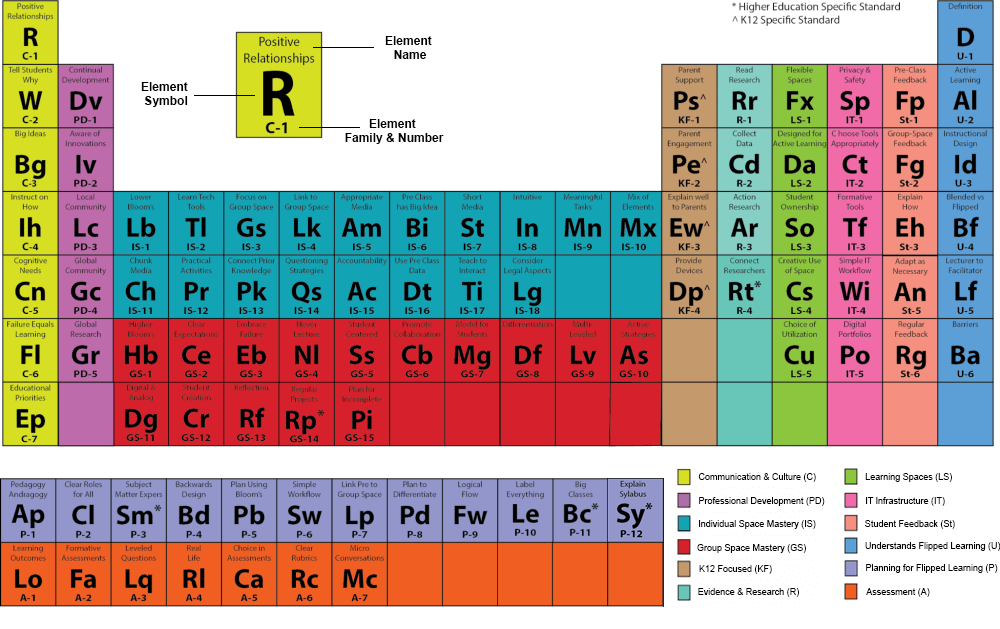The Global Elements of Effective Flipped Learning (GEEFL) framework outlines the essential components for successful flipped learning implementation. These elements highlight the importance of a flexible and inclusive learning environment, where learners have access to various content formats and opportunities for interaction. In a flipped learning setting, educators shift from being content deliverers to learning facilitators, promoting active and collaborative learning experiences. This project focuses on adults, therefore, distinguishing between Pedagogy and Andragogy is a crucial issue.

Adult & Young Learner: Andragogy is the approach to teaching adults (and should not be messed with pedagogy).
Assessment and feedback play a crucial role in the GEEFL framework, as they allow for continuous improvement and the alignment of learning objectives with learner performance. The GEEFL Elements emphasize professional development for educators, fostering a community of practice where instructors can share best practices, strategies, and resources for effective flipped learning.
This table shows the GEEFL framework elements, ordered like a “Periodic System”.

This table shows the “Global Elements for Efficient Flipped learning”. These elements are an essential part of the Flipped Learning 3.0 Framework. Pedagogy and Andragogy is an element in the field “”Planning for Flipped Learning”
In this article, we describe the element P-1 AP (from the family “Planning for Flipped Learning”).
Pedagogy and Andragogy
“Understand the principles of andragogy and pedagogy in designing courses and lessons.”
| Pedagogy | Andragogy | |
Origin |
The term “pedagogy” comes from the Greek words “paid,” meaning “child,” and “agogus,” meaning “leader.” It has been the dominant approach to education for centuries. | The term “andragogy” comes from the Greek words “aner,” meaning “man,” and “agogus,” meaning “leader.” The concept was popularized by American educator Malcolm Knowles in the 20th century. |
Focus |
Pedagogy is the method and practice of teaching children. It emphasizes the role of the teacher as an authority figure and the transfer of knowledge from the teacher to the students. | Andragogy is the method and practice of teaching adults. It emphasizes self-directed learning, the practical application of knowledge, and the learner’s prior experience and motivation. |
Assumptions |
Pedagogical approaches assume that children have little or no prior knowledge, need structure and guidance, and learn best when teachers are directive. | Andragogical approaches assume that adult learners are self-motivated, have accumulated life experiences, are goal-oriented, and want to apply their learning immediately. They often prefer to be involved in learning and take responsibility for their own learning. |
Teaching methods |
Pedagogical methods often include lectures, demonstrations, memorization, and repetition. Teachers play a central role in decision-making, curriculum design, and evaluation. | Andragogical methods often include problem-based learning, group discussions, case studies, and collaborative projects. Teachers act as facilitators, encouraging learners to reflect on their experiences, share ideas, and explore new concepts. |
In summary, pedagogy focuses on teaching children in a structured, teacher-centered environment, while andragogy focuses on facilitating learning for adults in a more flexible, learner-centered environment. Both approaches have their merits and can be effective depending on the context, learner characteristics, and educational goals.
Andragogy in the Flipped Learning 3.0 Framework uses an active learning approach by emphasizing the involvement of adult learners in the learning process, fostering their intrinsic motivation, and encouraging them to apply their knowledge and experience to solve problems or complete tasks. Active learning in andragogy aims to make the learning experience more engaging, meaningful, and relevant for adult learners, promoting deeper understanding and long-term retention of the material.
The active learning approach focuses on 6 major items:
- The learning process is learner-centered.
In an active learning environment, adult learners take responsibility for their own learning. They set their own goals, identify their learning needs, and actively participate in the learning process. - Learners have prior experience .
Active learning in andragogy acknowledges and builds upon the rich experiences that adult learners bring to the table. These experiences can be used as resources for learning, providing relatable examples and fostering discussions. - Problem-based learning increases motivation and the relevance of the learning experience.
Adult learners are often more motivated when they can see the relevance of what they are learning. Problem-based learning encourages learners to apply their knowledge and skills to real-world problems or situations, making the learning experience more meaningful and practical. - The learning process (mainly in the Group Learning Space) includes collaboration and social interaction.
Active learning approaches in andragogy encourage adult learners to collaborate and interact with their peers. This can involve group discussions, team projects, or peer coaching, allowing learners to share their experiences, perspectives, and expertise. - Self-reflection and self-assessment are a means of the learning process.
Active learning in andragogy promotes self-reflection and self-assessment, encouraging learners to evaluate their progress, recognize their strengths and weaknesses, and identify areas for improvement. - The learning process enables flexibility and adaptability.
Active learning approaches in andragogy allow for flexibility and adaptability, catering to the diverse needs, interests, and learning styles of adult learners. This can involve offering a variety of learning materials, activities, and assessment methods to support different learners.
This approach supports adult learners in developing critical thinking, problem-solving, and self-directed learning skills, fostering a more engaging and meaningful learning experience.
